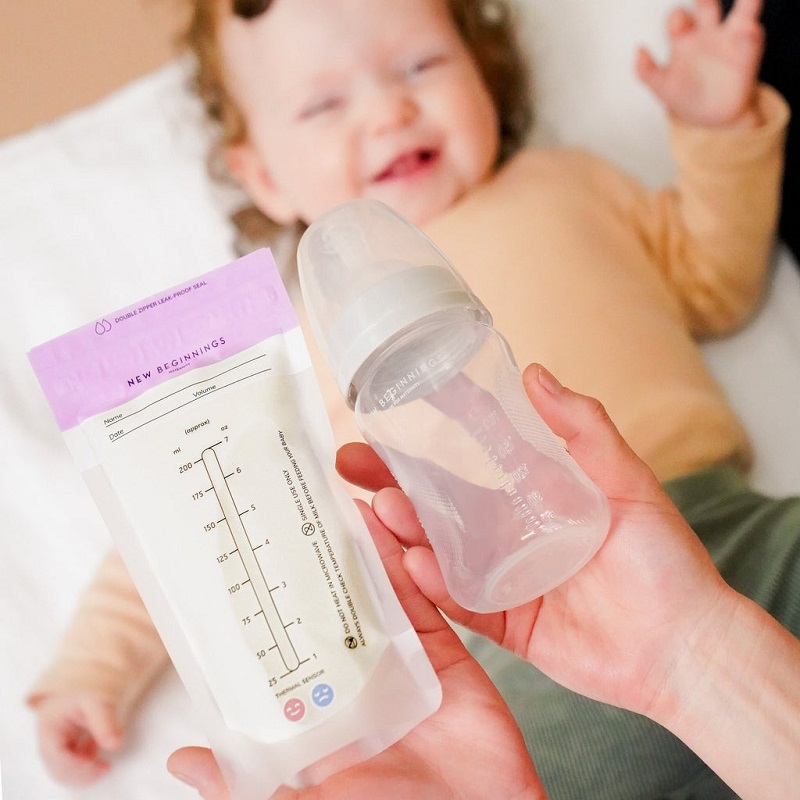The Growing Demand for Breast Milk
In modern society, the quest for breast milk is on the rise. Health-wise, breast milk is shown to have many benefits for infants. It is rich in nutrients and antibodies. These help babies fight off viruses and bacteria. Lactation issues, adoption, and surrogacy drive many to seek it. Career demands also mean some mothers turn to the marketplace for breast milk for their babies.
Demand growth mirrors awareness of breast milk benefits. Social media and parenting forums highlight these. They foster communities where moms support each other. This includes sharing milk. Busy lifestyles contribute to growth, too. Parents want the best for their children. They seek convenient ways to provide nutritious breast milk when they can’t produce it themselves.
The breast milk for sale market grows as demand increases. Sellers come from various backgrounds. Some are mothers with excess milk. They wish to help others while making some income. People trust this form of supply. Its growth also brings challenges. Regulation, safety, and ethical issues come to the forefront.
To sum up, several factors push the demand for breast milk. These factors are health benefits, personal circumstances, and modern lifestyles. The market reacts to cater to this need. Families see value in buying breast milk. They seek reliable sources that offer health advantages for their infants.
Key Factors to Consider When Purchasing Breast Milk
When buying breast milk, it’s crucial to focus on several factors. These ensure the milk’s quality and safety for your baby. Here are the key considerations:
- Source Verification: Know where the milk comes from. Choose reputable sources. Check if the donor has undergone health screenings.
- Nutritional Content: Ensure the milk is nutritionally rich. Look for providers that offer detailed information about the milk’s components.
- Storage and Handling: Find out how the supplier stores and handles the milk. Proper storage is key to maintaining its benefits.
- Pasturization: Ask if the milk is pasteurized. This process kills harmful bacteria without destroying nutrients.
- Transparency: Opt for sellers that are open about their processes. They should share how they collect, store, and ship the milk.
- Allergy and Health Concerns: If your baby has special health needs, make sure the breast milk matches those requirements. Check for potential allergens.
- Price and Accessibility: Consider your budget and how easily you can access the milk. Compare prices but don’t compromise on quality for cost savings.
- Ethical Practices: Learn about the seller’s ethical standards. Support those who maintain high ethical practices in sourcing and selling.
By keeping these factors in mind, you can make an informed decision. Always prioritize your baby’s health and safety when purchasing breast milk.
Current Trends in the Breast Milk Market

The breast milk market in 2025 shows distinct trends. The demand curve for breast milk keeps growing. This trend aligns with increased knowledge about its benefits. Busy parents now rely more on the market.
In response, online platforms for breast milk sales flourish. These digital marketplaces connect buyers with sellers quickly. Secure and fast transactions are their main allure. Sellers list their surplus milk. Buyers can browse options with ease.
Another trend is the rise in specialized services. These include breast milk delivery and subscription offers. Such services promise convenience. They cater to families needing regular supplies.
Importantly, customized breast milk solutions gain traction. Diets of donor mothers can tailor to babies with specific needs. Services also start to focus on premature infants’ needs. They require highly specialized nutrition.
Social networks play a vital role. Here, peer-to-peer sharing gains popularity. Mothers with abundant supply extend help to those in need. They form tight-knit communities.
Lastly, price models evolve. As demand rises, so does the cost. Yet, many try to keep it accessible. Sellers balance making a fair income with ethical considerations.
In summary, trends in the breast milk for sale market reflect a mix of tech innovation, community engagement, and ethical business practices. These developments aim to satisfy a growing demand, ensuring infants’ health needs meet promptly and safely.
How Technology is Shaping the Buying and Selling Process
The breast milk market has seen significant shifts, largely due to technological advancements. Browsing for ‘breast milk for sale’ has become more streamlined, discreet, and user-friendly than ever before. Here’s how technology is evolving the buying and selling process:
- Online Marketplaces: Websites and apps specialize in the breast milk trade. They offer platforms where sellers can post, and buyers can shop with ease. These digital arenas simplify matching supply with demand.
- Secure Payment Systems: Transactions are now safer and more reliable. Protected payment options help prevent fraud and ensure trust in the market.
- Quality Verification Tools: Technology allows for better scrutiny of breast milk quality. Sellers can provide proof of health screenings and milk testing. Buyers gain peace of mind through these validations.
- Mobile Applications: Smartphones enable parents to access breast milk services on the go. Quick searches and instant purchases become a reality with mobile apps dedicated to breast milk sales.
- Inventory and Shipping Tracking: Advanced logistic solutions let buyers track their orders. This process ensures transparency and timely delivery.
- Customization Algorithms: AI and data analytics can predict preferences. They tailor options based on past purchases and searched criteria. This means personalized services for each buyer.
- Community Platforms: Forums and social media groups for breastfeeding support integrate market features. They offer spaces for discussion, reviews, and direct peer-to-peer transactions.
As technology continues to grow, so does its role in the breast milk for sale industry. It brings efficiency, security, and customization to the forefront. Ease of use and reliability become top priorities. Sellers and buyers meet in a landscape shaped by high-tech solutions, all aimed at improving health and convenience for infants and families alike.
Health and Safety Guidelines for Breast Milk Purchases
When considering breast milk for sale, safety is paramount. Here are essential guidelines for health and safety when purchasing breast milk:
- Health Screenings: Sellers should provide proof of health screenings. These confirm that they’re free from infectious diseases.
- Milk Testing: Verify that milk undergoes testing for bacterial contamination. This ensures safety before consumption.
- Safe Packaging: Ensure milk comes in sterilized containers. Packaging should seal properly to prevent exposure.
- Clear Labeling: Containers must be clearly labeled. Dates of expression and any special handling instructions are crucial.
- Proper Transportation: The milk should stay at the right temperature during shipping. This maintains its nutritional quality.
- Storage Information: Get clear guidance on storing the milk. Follow instructions to preserve its integrity.
- Use By Dates: Pay attention to use by dates. Use the milk within recommended timelines for safety.
- Handling Instructions: Understand how to handle milk safely. This includes thawing and warming techniques.
- Seller Credentials: Choose sellers with credible backgrounds. Check for certifications or qualifications in handling breast milk.
- Feedback and Reviews: Read reviews from other buyers. Positive feedback can indicate a seller’s reliability and adherence to safety standards.
By following these guidelines, you significantly reduce health risks. You also ensure that your baby receives safe, nourishing breast milk. Prioritize these safety measures in your purchasing process for peace of mind.
Ethical Considerations in the Breast Milk Market

As the breast milk for sale market evolves, so do ethical concerns. These concerns are vital. They touch on the dignity and welfare of both sellers and infants. Here are key ethical aspects to consider:
- Informed Consent: Sellers should give breast milk with full knowledge of its use. They must know the terms of sale and their rights.
- Exploitation Risks: There’s a risk of exploiting mothers in need of cash. Buyers should only support fair practices. Avoid those taking advantage of others.
- Quality Assurance: Ethical sellers provide top-quality milk. They commit to safety, not just profit.
- Surplus vs. Need: Selling surplus milk is common. Yet, some worry about sellers overproducing. This can strain their health. Balance is essential.
- Privacy: Sellers’ identities often stay private. Ethical platforms protect these details. Buyers and sellers respect each other’s privacy.
- Profit Sharing: Some argue for sharing profits with sellers. They provide a vital service. Fair compensation is only right.
- Donation vs. Sale: Donation fosters community and support. Yet, selling helps mothers who can’t breastfeed. Ethical judgments can be complex.
- Regulations Adherence: Sellers and platforms must follow laws. This protects all parties involved.
To sum up, ethical deliberations in the breast milk for sale market matter. They safeguard respect and fairness. Buyers and sellers must stay mindful of these issues as the market grows.
The Economic Impact of Breast Milk Sales
The market for breast milk for sale significantly affects the economy. Its impact stretches across healthcare, family budgets, and the livelihoods of sellers. Here, we explore the manifold economic consequences of breast milk trading in 2025.
- Healthcare Cost Savings: By providing crucial nutrients and antibodies, breast milk can lead to healthier babies. This lessens the need for medical interventions and reduces healthcare costs.
- Income Source for Families: Mothers with excess milk turn to sell as an income source. This can be a substantial financial help for families.
- Consumer Spending: As more families purchase breast milk, there’s an increase in consumer spending. This spending supports the market, driving its growth.
- Market Competition: As demand grows, more sellers enter the market. This competition can drive innovation and potentially lower prices.
- Job Creation: The industry generates jobs in logistics, healthcare, and customer support. These employment opportunities contribute to economic stability.
- Government Revenue: With the right regulations, sales of breast milk could be taxed. This would bring additional revenue to governments.
- Ethical Considerations and Economic Balance: While profits matter, ethical considerations remain crucial. Sellers must find a balance between making a fair income and fair pricing practices.
In conclusion, the breast milk for sale marketplace presents both opportunities and challenges. Its rise promises economic benefits but also calls for careful attention to pricing fairness and ethical standards. By recognizing the financial implications, stakeholders can manage the market’s growth responsibly.
Legal Framework and Regulations Surrounding Breast Milk Sales

The legalities of trading breast milk remain complex. As the market grows, so does the need for clear regulations. These laws aim to protect buyers, sellers, and most importantly, infants. Here are the key aspects of the legal framework regarding breast milk sales:
- Licensing Requirements: Sellers may need licenses to sell breast milk legally. This helps authorities monitor and regulate the market.
- Health and Safety Standards: Regulations set standards for milk quality. They cover screenings, testing, and storage practices.
- Consumer Protection Laws: Laws are in place to safeguard consumers. They ensure buyers receive safe and as-described products.
- Ethics and Fair Trade: Legal guidelines demand ethical practices in sales. They discourage exploitation and encourage fairness.
- Privacy Protections: Selling breast milk requires confidentiality. Laws protect personal information of both buyers and sellers.
- Cross-border Trade: For sales across regions, international laws come into play. They handle the complexities of international trade of human milk.
- Taxation and Revenue: Understanding tax obligations is key. Both buyers and sellers must know the tax implications of trading breast milk.
Buyers and sellers need to stay informed about these laws. Compliance is vital for a secure and ethical marketplace. As society understands the value of breast milk, the legal framework adapts. It ensures the market’s integrity and the well-being of infants and their families.